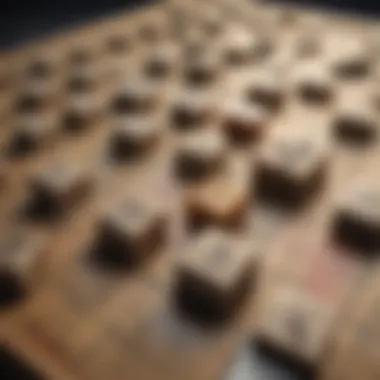Exploring the Intricacies of Sudoku by Nikoli


Intro
Sudoku by Nikoli stands out in the vast landscape of puzzle games. As it originated in Japan and gained fame worldwide, it captivated many who enjoy cerebral challenges. Unlike conventional versions, this adaptation by Nikoli presents its own twists, enticing both veterans and newcomers to logic puzzles.
Through this article's exploration, you’ll discover the essence of Nikoli Sudoku, its inception, unique gameplay mechanics, and how its variations infuse fresh dynamics into a traditional game. Let's embark on this journey to understand why this specific variant appeals to so many and what intricate details it offers.
Game Reviews
Overview
Sudoku by Nikoli captures attention with its clean design and thought-provoking puzzles. The game retains the foundational structure of traditional Sudoku—a grid split into regions where the objective is to fill cells, avoiding duplication of numbers in any row, column, or sub-grid. Nikoli adds its own charm, markedly influencing gameplay and difficulty levels.
Gameplay
Layered with distinctive rules, the gameplay invites players to flex their cognitive skills. Many versions highlight varying grid sizes, number limits, and the introduction of clues.
- Classic: Retains the traditional rules.
- Variant Types: Such as Shaded Sudoku or Irregular Sudoku. These alter the layout and rules only at select points.
Tackling these puzzles requires strategic thinking. Missteps can quickly lead to dead ends, challenging even the smartest of players.
Storyline
While classic Sudoku usually does not have a storyline, Sudoku by Nikoli offers each puzzle as more than a game; it often acts as a canvas for logic-oriented interactions. The narrative lies within the challenge itself, where every completed puzzle feels like unveiling a piece of art.
Graphics
Visual attribution regards clarity above all. Sudoku by Nikoli operates with a minimalist aesthetic that emphasizes functionality. Bright lines separate distinct puzzle areas without glamour distractions. Such a clean interface keeps players focused solely on problem-solving.
Soundtrack
Many users appreciate the silence while concentrating. Therefore, the absence of a complex soundtrack in Sudoku by Nikoli provides a serene backdrop. The minimalist musical options provide subtle effects for correct answers, thereby rewarding players quietly.
Pros & Cons
This edition does have strengths and weaknesses:
- Pros:
- Cons:
- Engaging variants expand traditional gameplay.
- Clear aesthetics keep focus.
- Newcomers might find some variants unexpectedly complex.
- Limited interactive elements compared to other popular games.
Final Verdict
In summary, Sudoku by Nikoli distinguishes itself through refined gameplay and minimalist style. For both novices wanting to dip into logic while challenging experts with its variations, it produces satisfaction through an exciting intellectual hunt.
The beauty of Sudoku by Nikoli lies in simplicity melded with complexity.
Prolusion to Sudoku by Nikoli
Sudoku is not just a game; it symbolizes logical thinking and strategic planning. The variant developed by Nikoli adds unique rules and characteristics, settig it apart from diffirent Sudoku versions. This section presents the foundation of Sudoku by Nikoli, enabling readers to appreciate its depth.
Definition and Background
Sudoku by Nikoli specifically refers to a style of the classic Sudoku created by the Japanese company Nikoli. In its essence, Sudoku involves a grid composed typically of 9 rows and 9 columns, enclosed in a 3x3 block environment. The objective remains consistent: fill the empty squares with integers from 1 to 9 in such a manner that each row, column, and small grid exhibits these numbers without repetition.
History say that this number puzzle first appeared in the United States in the late 1970s under the name, Number Place.
However, it really took off in Japan in the ’80s when Nikoli popularized it and gave it the name Sudoku, which translates to “single number.” The puzzle gained global acknwoledgement when it was featured in The Times of London in 2004.


Nikoli's Contribution to Sudoku
Nikoli has been crucial in nurturing the puzzle phenomenon, establishing the standardized rules that many players adopt today. They introduced specific variations, adjusting difficulty levels and extending the gaming experience.
Uniquely, Nikoli conceptualized different forms of Sudoku, thus enticing puzzle amateurs and experts alike. Localized designs, including special rules and conditions, highlight how Nikoli infuses creativity into traditional gameplay. Such innovations further propel the puzzle's appeal, undoubtedly easing it into mainstream consciousness.
As a publisher, Nikoli shaped how Sudoku reaches consumers, providing puzzle enthusiasts with both opportunities for competition and community bonding. Furthermore, their meticulous approach implies not just leisure but growth, channeling logical reasoning and discipline through engaging play. Thus, Nikoli keeps playful learning at its core, making Sudoku accessible and enriching for everyone interested.
Origins of Sudoku
Understanding the origins of Sudoku lends depth to its multifaceted nature, particularly the specific variant that Nikoli introduced. Recognizing these roots allows enthusiasts to appreciate the evolution of the game from a simple pencil-and-paper affair to a compelling intellectual challenge. Every game has its background, serving not only as a framework but also providing insight into its enduring popularity and adaptation across cultures.
Historical Context of Sudoku Games
Sudoku, in general, is rooted in ancient puzzle concepts. Its true inception can be traced back to the 18th century in Europe with the development of Latin squares, a mathematical construct. However, the game as we know it today found honor and visibility in Japan in the late 20th century through Nikoli.
Nikoli is widely acknowledged for transforming Sudoku into a mainstream phenomenon rather than merely a mathematical exercise.
Japanese publisher Nikoli began introducing Sudoku puzzles to the public in 1984. The company was pivotal in presenting the puzzle in its current incarnation, specifying both rules and layout that would earn its place in the global consciousness. Agents from Nikoli meticulously crafted various styles and levels of difficulties. Their efforts enabled countless sudoku enthusiasts to engage successfully, both casually and competitively.
Nikoli and the Puzzle Revolution
Nikoli's influence on the modern Sudoku explosion cannot be overstated. During the 1980s, they not only standardized the rules but also popularized the puzzle form that integrates logic and pattern recognition. This period saw a psychological engagement unlike any previous puzzle craze.
The advent of Nikoli's range of variations enhanced the concept that Sudoku extends beyond its classical perception. Different formats emerged such as
Understanding the Rules
Understanding the rules of Sudoku by Nikoli is essential for both new and seasoned players. This variant of Sudoku involves intricate strategies and detailed logical reasoning. By familiarizing yourself with its conventions, you open a gateway to not just play, but truly appreciate the complexity embedded within each puzzle. Clarity around the basic principles leads to better performance and greater enjoyment.
Learning the foundational rules is indispensable for building advanced skills later. Knowing where numbers can and can’t go clears the way for more strategic thinking and foresight.
Basic Rules of Sudoku by Nikoli
Sudoku by Nikoli follows simple yet strict rules that are fundamental to gameplay. The game consists of a grid, typically 9x9, divided into nine smaller 3x3 boxes. The primary goal is straightforward: fill the grid so that each row, each column, and each 3x3 box contains all of the digits from 1 to 9.
Here's a closer look at the rules:
- Each number can only appear once in each row, column, and box.
- Some numbers may be provided at the start of the game, assisting in initial strategies.
- You must use logical reasoning to deduce the placement of the remaining numbers.
A crucial aspect lies in the observation of patterns, which enhances problem-solving skills.
These basic concepts form the crux for players to build strategy and solutions. Weak understanding of these rules can lead to common pitfalls, making it even harder to solve even a seemingly easy puzzle. Developing early competence in these basics can dramatically influence the player's overall success.
Advanced Strategies and Techniques
Once the basics are master, exploring advanced strategies will elevate one’s game further. Understanding the theme of logical deduction opens up various methods for solving grid puzzles more effectively. Techniques such as marking potential candidates in cells or visualizing chains of influence can simplify the most chaotic puzzles.
Some notable advanced techniques include:
- Naked Pairs: Identifying pairs of cells which contain only the same two candidates helps to streamline their surrounding cells.
- Hidden Singles: Recognizing a single possibility for a number in a row may lead to quicker deductions across the entire grid.
- X-Wing Method: Allow for strategies that align with visibility constraints across rows and columns.
Implementing these strategies needs practice. Constant engagement with different Sudoku puzzles will enhance both proficiency and intuition. Embracing these advanced techniques not only improves chances of completing puzzles but also nourishes cognitive functions, delivering long-term benefits in logical thinking and problem-solving abilities.
By focusing on solidifying your understanding of these rules and strategies, you harness the full power of Sudoku, creating a more rewarding puzzle-solving experience.
Variants of Sudoku by Nikoli
Sudoku by Nikoli presents a spectrum of variations that cater to diversifying gameplay and enhancing the overall puzzle experience. These variants not only deepen the player's engagement but also challenge logic and reasoning in unique ways. Understanding the various formats and themes is critical for puzzle enthusiasts exploring beyond the traditional approach of Sudoku.
Different Game Formats
Nikoli has created several game formats that innovate on the basic principles of Sudoku. These formats often introduce additional guidelines or adjusted grid layouts. A few notable variants include:


- Killer Sudoku: Players must use basic Sudoku rules but solve the puzzle with constraints on the sums of specific groups of regions indicated by dotted lines.
- Hyper Sudoku: An extension of the classic format, where each number must appear exactly once in additional 3x3 subsquares within the traditional grid.
- Samurai Sudoku: Combining multiple grids, this format merges several traditional puzzles into one, increasing complexity and fostering new problem-solving approaches.
- Jigsaw Sudoku: The grid is irregularly divided into regions, diverging from traditional rows and columns.
These altered formats encourage players to adapt their strategies. Engaging with different styles enhances skills and broadens perspective on logical deduction.
Unique Puzzle Themes and Challenges
Nitoli's Sudoku also aims for creativity. Featuring themed puzzles enrich the Sudoku experience, catering to various interests. For instance, themed variants may revolve around popular culture or specific concepts. This can include:
- Word Sudoku: Utilizing letters instead of numbers where players must complete words corresponding to the grid configurations.
- Scenic Sudoku: Incorporating artistic designs into the grids which inform the layout and features of the puzzle's format.
- Mathematical Sudoku: Adding operations between cells requires players to perform arithmetic operations while adhering to base Sudoku rules.
The essence of these themed puzzles lies in their ability to engage different cognitive skills and interests while maintaining the core logical framework. Designers intenting to experiment become a vital part of the modern Sudoku landscape as ideas evolve and interpretations expand.
Engaging with different variants and themes allows puzzlers not only to increase their proficiency, but opens doors to creative and stimulating experiences.
Through exploring these many formats and challenges, Nikoli cultivates a vibrant Sudoku community that thrives on innovation and imagination. The emerging formats and unique themes contribute to the legacy of Sudoku, transforming what was once a simple pastime into a complex intellectual activity.
The Role of Logic in Sudoku
Logic plays a crucial part in the game of Sudoku created by Nikoli. It is not just about filling in numbers on a grid. Instead, it requires a process of logical reasoning and deduction. Understanding and utilizing these logic-based strategies allows players to solve puzzles with efficiency. This section highlights the critical elements and benefits of logical problem-solving within this intellectual game.
Logical Reasoning and Problem-Solving
Effective problem-solving in Sudoku largely depends on logical reasoning. Players often start with noting possibilities for each empty cell in the grid. This method helps narrow down options in a systematic way. For instance, if a player identifies that the number 5 cannot be placed in certain areas due to existing numbers in the column or row, they can eliminate those options effectively.
This iterative process aids in making connections between various numbers and their placements. Players engage in a cognitive exercise that fosters critical thinking skills. The very nature of Sudoku acts as a framework that encourages foresight—anticipating the consequences of the number placements is vital.
Some strategies for enhancing logical reasoning skills in Sudoku include:
- Cross-referencing rows, columns, and boxes systematically.
- Taking note of patterns that emerge from similar configurations.
- Using pencil markings for possible candidates before taking definitive steps.
By engaging with these logical constructs, players not only achieve solutions faster but also enhance their mental agility and analytical capability. The satisfaction derived from solving a complex puzzle through logical reasoning often leads to deeper engagement with the game itself.
Developing Cognitive Skills through Play
Sudoku challenges more than just mathematical reasoning; it engages cognitive and problem-solving skills. Each puzzle provides a dynamic workout for the brain. Players across various skill levels contribute to improving memory and reasoning capabilities.
Here are certain cognitive benefits arising from regular Sudoku engagement:
- Improved Short-Term Memory: Keeping track of possible number placements foster memory usage in players.
- Enhanced Concentration: The need to pay attention to multiple elements simultaneously trains focus and minimizes distractions.
- Boosted Logical Thinking: Regular practice encourages clearer thinking, making connections and predict outcomes systematically.
Engaging in Sudoku by Nikoli thus not only serves to entertain but also promotes mental fitness through play. The problem-solving aspect integrates learning as players assume responsibility for their progression and unravel complex puzzles over time. In short, solving these intriguing puzzles is both a challenge and an opportunity for cognitive growth.
“Sudoku is a blend of logic, patience, and creativity, offering players a continuous journey of mental growth.”
Nikoli's Sudoku in Popular Culture
Nikoli's Sudoku has transcended the boundaries of traditional logic games, making a notable impact on popular culture. Its influence can be seen not only in gaming communities but also in various forms of media and entertainment. The popularity of Sudoku represents a collective engagement with cognitive challenges, drawing in fans from diverse backgrounds. Understanding this cultural phenomenon enhances the appreciation for Sudoku, particularly the distinct version offered by Nikoli.
Impact on Media and Entertainment
The significance of Nikoli's Sudoku within media cannot be understated. As Sudoku puzzles have infiltrated newspapers, magazines, and online platforms, the role of Nikoli in shaping these puzzles is evident. Their design principles emphasize variety and creativity, leading to a more engaging experience for players. The customization and refinement of these puzzles attracted a large audience, enhancing the overall appeal of Sudoku.
- Printed Publications: Newspapers and magazines often feature Sudoku puzzles, encouraging readers to engage in mental exercise during their leisure time. Nikoli's distinctive puzzles add character to these publications, adding fresh challenges for regular solvers.
- Television: Various television shows have presented Sudoku puzzles either as central themes or as part of larger game segments. These appearances help introduce the game to new audiences, reinforcing its status as a staple in logical reasoning entertainment.
Moreover, the rise of Sudoku tournaments and competitions has further cemented its place in popular culture. Events organized around Nikoli’s guidelines not only showcase skill but also create a community, allowing enthusiasts to connect and share strategies.
The tie between puzzles and culture emphasizes thoughtfulness in entertainment. Nikoli's unique offerings give players joy and enforce the mental agility enjoyed through systematic logic puzzles.
Sudoku in Mobile and Online Platforms


The digital revolution has propelled Sudoku into a realm dominated by smartphones and the internet, significantly broadening its reach. Nikoli's Sudoku has adapted well to these new formats, resulting in diverse applications that resound with modern gamers and enthusiasts.
- Mobile Apps: A surge in mobile Sudoku applications allows users to solve puzzles on the go. Popular apps like
Engaging the Community
Engagement within the Sudoku community enhances not only the enjoyment but also the depth of understanding for players. A dedicated community often leads to the exchange of ideas, innovative strategies, and improved puzzle-solving techniques. Connecting with others over common interests can elevate the overall experience. Engaging the Sudoku community plays an essential role in fostering enthusiasm and creating an inclusive environment for new players.
Nikoli's Community Contributions
Nikoli has made significant strides to engage the Sudoku community in various ways. Perhaps most notably, they have created platforms for both novice and seasoned players. These platforms serve to share puzzles and strategies, facilitating growth and increase overall interest.
- Puzzles and Magazines: Nikoli regularly publishes magazines that are rich in information and offer exclusive puzzles. These publications are a valuable resource for self-paced learning and enjoyment.
- Workshops: The company often organizes and hosts workshops aimed at educating participants about Sudoku techniques. This helps skill levels improve, transforming casual players into experts.
- Online Forums: Nikoli supports forums where enthusiasts can communicate, ask questions, and share solutions. The access to these resources enriches the puzzle-solving experience, creating camaraderie among participants.
By contributing to diverse platforms, Nikoli draws a larger audience into the fold, demonstrating their commitment to enhancing the Sudoku community.
Competitions and Championships
Competitions and championships serve as gatherings to showcase skills and foster a sense of belonging in the Sudoku community. These events allow players to test strategies in real-time against fellow enthusiasts, stimulating a spirit of healthy competition. Not only do they afford recognition to those who excel, but they also provide networking opportunities among avid players.
Nikoli plays a pivotal role in organizing regional and national championships, drawing participants across various skill levels. Here are some highlights of their contributions:
- Annual Championships: These events draw numerous participants, with each year unveiling new techniques among top competitors.
- Mentorship Programs: Experienced players often guide beginners to aid their skills development, helping to cultivate an inclusive environment.
- Events Online and Offline: With ongoing changes in technology and interactions, Nikoli's competitions have adapted, offering both physical gatherings and online events to engage players around the globe.
As awareness about Sudoku expands, so does the vibrancy of the community through engaging competitions.
These competitions, organized meticulously, affirm Nikoli’s dedication to enhancing the community and ensuring that every player has access to opportunities for growth.
Resources for Sudoku Enthusiasts
In the realm of Sudoku, resources form the backbone of understanding and engaging with this cerebral challenge. They provide puzzle enthusiasts with diverse tools, insights, and stimulation necessary to deepen their comprehension of Nikoli's version of Sudoku. This segment delves into valuable resources that are indispensable for those keen on mastering Sudoku.
Books and Publications by Nikoli
Nikoli has made significant contributions to the literary landscape of Sudoku. Books offer not only a source of puzzles but also valuable commentary on techniques and strategies. Here are some notable titles by Nikoli that any serious enthusiast should consider:
- Sudoku by Nikoli: This publication features a variety of puzzles that range in difficulty, ideal for both beginners and experienced players.
- Sudoku Variants: This book explores different takes on the classic game, stated to challenge conventional thinking.
- The Art of Sudoku: It delves into practical and aesthetic feelings one may have while solving puzzles. Each volume thoughtfully presents challenges alongside detailed solutions, illustrating its commitment to excellence.
Moreover, the accompanying commentary reaffirms their initiatives in enhancing logical education through puzzles. With every page, readers don't merely engage with numbers; they develop a structured mindset attractive to problem solvers.
Online Resources and Tools
In today’s digital age, numerous online resources cater to Sudoku fans. These platforms offer a dynamic experience, unlike static paper puzzles.
Some of the valuable online resources are:
- Nikoli's Official Website: This is a central hub for fans where new puzzles are regularly published, often along with verification tools.
- Sudoku Solvers: Interactive solvers can assist in validating one's work or providing hints when one gets stumbled. These digital platforms not only bolster your skills but also quantify how efficient you are in problem-solving.
- Online Forums and Communities: By visiting platforms like Reddit, Sudoku enthusiasts can engage in discussions, seek advice, and share experiences . These communities are central for developing deeper connections with other players worldwide, enriching the overall solving experience.
Utilizing these resources enhances one’s skill set significantly. Engaging with a variety of problem formats encourages adaptability, a crucial element in honing one’s Sudoku aptitude.
“Rooms of resources greatly boost one's capabilities in the growing world of logic puzzles.”
The continuous evolution of Sudoku through literature and digital tools reflects its ever-expanding attractiveness. Enthusiasts can gain unlimited insight and strategize effectively, making these resources essential for mastery and enjoyment of Nikoli's intricate offering.
End
In closing, the exploration of Sudoku by Nikoli reveals a rich tapestry of intricate design and intellectual enjoyment. This unique variant contributes significantly to the broader puzzle landscape, attracting both seasoned players and newcomers alike.
The Lasting Legacy of Nikoli's Sudoku
Nikoli has left an indelible mark on the puzzle community. Their version of Sudoku not just reinvents the original game but elevates it to an art form. Here are some key aspects of this legacy:
- Innovative Variants: Nikoli has introduced numerous editions with unique rules and formats that challenge conventional problem-solving approaches.
- Cognitive Development: The puzzles by Nikoli stimulate logical thinking and enhance cognitive skills, making them not just entertaining but educational.
- Cultural Impact: Nikoli's Sudoku has permeated various forms of media, inspiring countless enthusiasts and creating a vibrant community of puzzle solvers.
Nikoli has changed the way the world engages with puzzles, ensuring that Sudoku stands not only as a timeless challenge, but also as a canvas for creativity and logic.
The intricacies of Nikoli's Sudoku reflect a commitment to quality and innovation. Understanding its legacy allows enthusiasts to appreciate the depth of thought behind each puzzle. This legacy continues to inspire a dedicated community and engages a new generation, ensuring that Sudoku remains a significant form of intellectual challenge for years to come. Whether discussed in academic circles or enjoyed in casual settings, the influence of Nikoli's contributions can certainly be observed.



